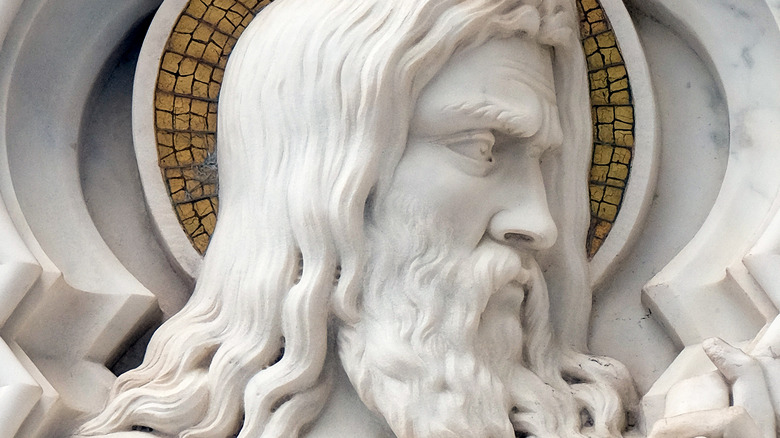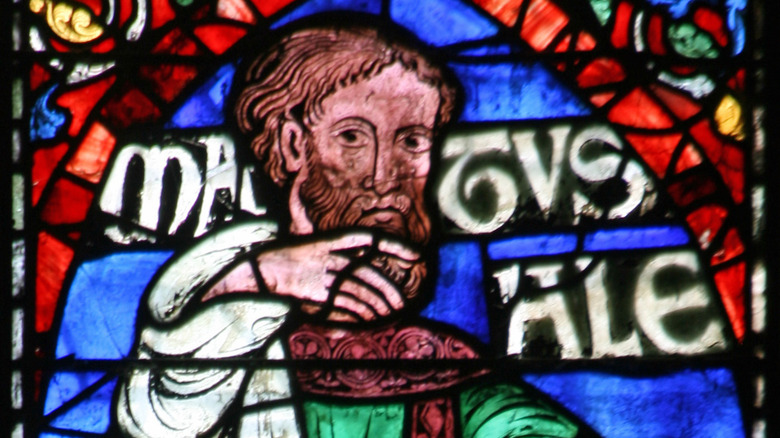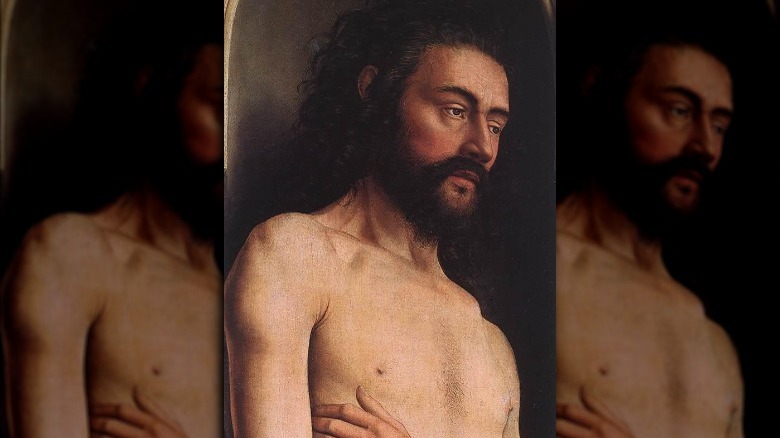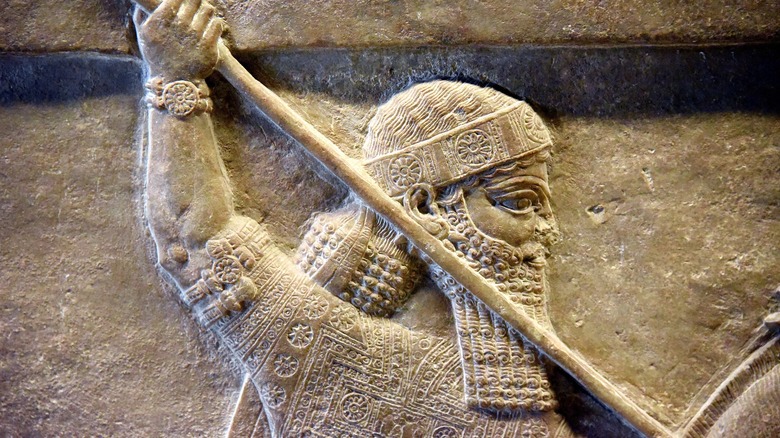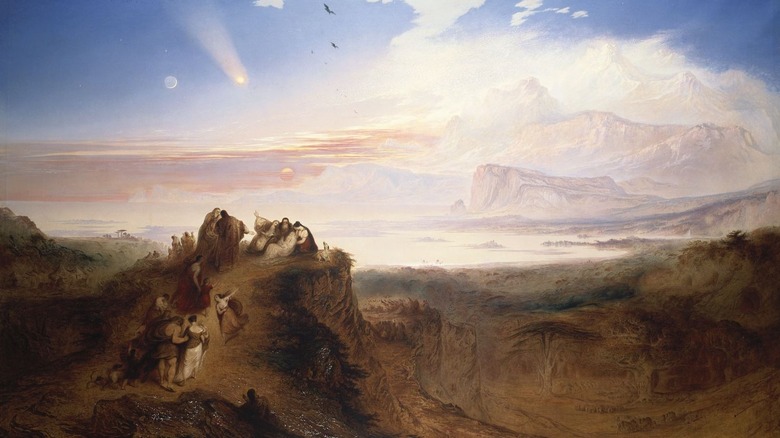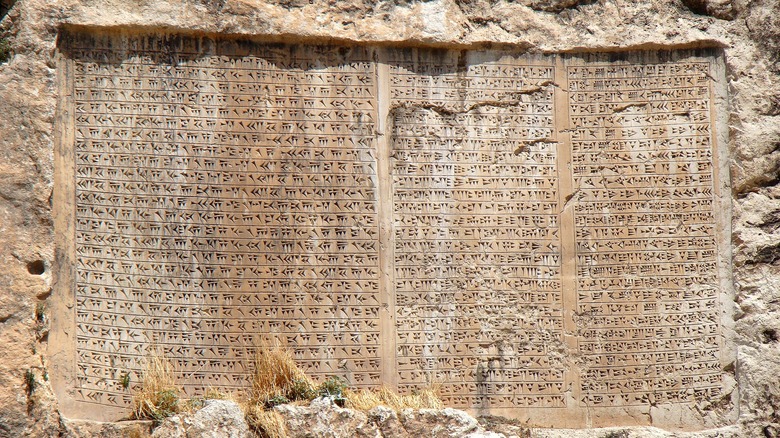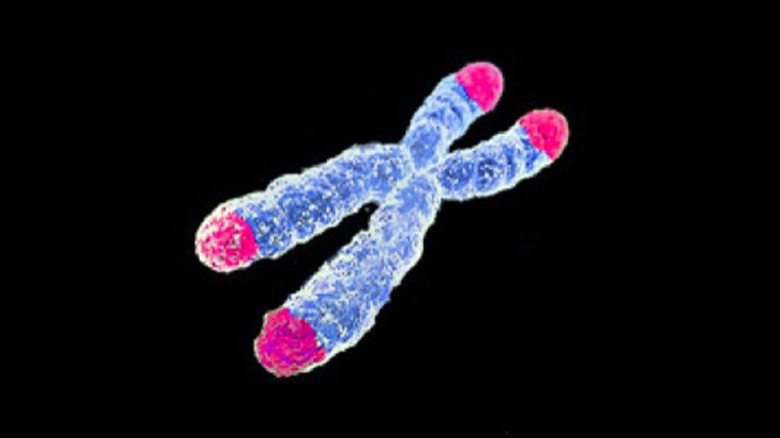The Untold Truth Of Methuselah
We're all pretty interested in extremes. Everyone apparently wants to climb the world's tallest mountain. Movie director James Cameron and a few other folks have successfully made it to Challenger Deep, the deepest known spot in any of the world's oceans. Joey Chestnut has eaten 76 hot dogs in one go (via Sports Illustrated). Many of us want to be the most notable at something or to have visited and experienced the most of what our existence and our planet has to offer.
But there are some things that are out of our control. Consider accidents of genetics, time, and space, like people who have reached extraordinary heights or enjoy some seriously plush inherited benefits. Consider Michael Phelps' ability to produce very minimal amounts of lactic acid and other biological quirks that helped to make him the most decorated Olympian of all time (via Biography). One of those factors is, to a large extent, age. Sure, you can eat right, exercise, and avoid toxic habits, but ultimately, our body can only go so far.
Unless, of course, you happen to be named Methuselah. Genesis, the first book of the Bible's Old Testament, contends that this barely mentioned Biblical patriarch was the oldest person of all time, racking up an impressive 969 years before finally dying. But how much do we really know about this figure? And is it even remotely possible for a human to see over nine centuries in their lifetime? This is the untold truth of Methuselah.
Methuselah is barely in the Bible
It seems like the title of "oldest man ever" would be a pretty big deal, all things considered. Sure, there are other notables in the Bible and other religious texts who have achieved great things, but you would expect complicated figures like King David or Abraham to also share space with the oldest old guy out there (at least according to the Jewish and Christian religious traditions). Yet, for all that, Methuselah is only mentioned in passing in a few Bible verses. In fact, if you happen to sneeze while reading through Genesis, you could very well miss his existence entirely.
According to Britannica, the key passage in question that established his age, at least within the Bible, is Genesis 5:27. The verse reports that he lived to be 969 years old, far more than any of the other ages reported in the text. He also gets a brief shout-out in a rather dry lineage list in I Chronicles 1:3, and another genealogy breakdown for Joseph, Jesus' earthly father, in Luke 3:23-38.
And, well, that's pretty much it. Searching through Hebrew and Christian scriptures produces practically nothing else about Methuselah, no matter how much you look. However, later commentaries, folklore traditions, and a few myths that predate the scriptures will help to round out the story of this supposedly very, very ancient man.
Methuselah is the oldest of a few long-lived patriarchs
Going by the age established for Methuselah in Genesis 5:27, he's the oldest known person in Jewish or Christian tradition. Yet, as staggering as a 969-year lifespan may seem to us puny humans today, who can only dream of reaching a comfortable 100 under the best of conditions, Methuselah wasn't the only super, super-centenarian mentioned in Genesis.
If we take a step back and read the rest of Genesis 5, it turns out that quite a few people got close to Methuselah's reported achievement. Adam — you know, first human ever, he of the whole Garden of Eden, partner of Eve, Tree of Life, and expelled from paradise fame — reportedly lived for 930 years until his death. His descendants seem to have been pretty long-lived, too, like Adam's son Seth, who made it to 912 years. Seth's own son, Enosh, made it to 905 years and also managed to father a son, Kenan, at 90. Noah, of ark fame, did his ancestor one better and generated three sons after he hit 500 years. Clearly, old age was no impediment to carrying on as normal for many.
Of course, given the human lifespans we face today, the ultra-long lives of Biblical figures present a real quandary. Biblical literalists accept the numbers as fact, more or less, while less rigid interpretations of Genesis hint that these centuries-old men may owe their achievements more to symbolic interpretations than anything else (via BioLogos).
Methuselah is linked to other longevity myths
Even a brief survey of other world religions and myths show a pretty crowded slate of ultra-old folks that could easily give Methuselah a run for his aged money. Ancient Greek writer Lucian of Samosata (who was also, admittedly, a satirist), once wrote of the Chinese "Seres" who could surpass 300 years in age. More fantastically, the "Eight Immortals" of Chinese mythology are said to be thousands of years old, as their name rather strongly implies (via Learn Religions).
Closer to home, at least Biblically speaking, both Methuselah's family and Methuselah himself share commonalities with Mesopotamian figures, like the mythical Ubara-tutu. According to "The Epic of Gilgamesh: Selected Readings from its original Early Arabic Language," Ubara-tutu supposedly reigned for 18,600 years as a king until a great flood swept over the land and apparently did away with Ubara-tutu as well. Then again, given the translation involved, it's possible that Ubara-Tutu was a ruler with a regular lifespan, a name for a larger dynasty, or even a reference to a whole tribe. Or, as the journal Perspectives on Science and Christian Faith points out, it could also be that Babylonians had a different and easily misinterpreted numbering system.
Some scholars contend that this connection between long-lived Babylonian rulers and Biblical figures is more obviously with Lamech, a cousin of Methuselah and father of Noah who features in Genesis 5:28-31. According to the text, Lamech lived for 777 years and died before the Great Flood.
The story of Methuselah may answer a Babylonian tradition
Though Methuselah's age seems pretty extraordinary to modern people, it pales in comparison to some other ancient tales of long-lived people outside of the Bible. Yet, that may well have been a specific response to tall tales of very old or even immortal people who were supposedly walking around in the ancient world. According to Encyclopedia.com, Babylonian stories often claimed to tell the legends of kings who lived for thousands of years. That would have then elevated them to godlike status for people who were surely living much shorter lifespans in the often-harsh world of ancient Mesopotamia and beyond.
It could be that Methuselah's comparatively paltry 969 years was meant to act as a contrast to the quasi-immortal ancient kings of other cultures and belief systems. He did not reach even a thousand years old, yet the Bible (or Biblical literalists, anyway) would have you believe that Methuselah was a real and very human man. Sure, he lived for a long time, but the truth of the matter is that Methuselah still died in the end, just like any man. As the theory goes, only the true God can really lay claim to immortality — Methuselah was there in part to prove that. But, in an effort to have their ancient cake and eat it, too, the originators of the Genesis lineage list may have still wanted to boost all those ages for the sake of inducing awe and wonder.
Methuselah shows up in some non-Biblical texts
When referencing the Bible, readers inevitably come up against the fact that Methuselah is, in many ways, little more than a bit player in the grand scheme of Judaism and Christianity. But he doesn't have to be a mere side note, at least not so long as you're willing to branch out a bit when it comes to research. And, by "branching out," we mean stepping away from the core texts of the Hebrew scriptures and canonical Christian Bible.
Methuselah appears in further detail in some extra-canonical books of the Bible, for instance. In the Book of Enoch, an ancient Hebrew text that's considered apocryphal (that is, it lands outside of the generally agreed-upon canon of religious literature for Judaism or Christianity), Methuselah makes a few more appearances. According to the Jewish Encyclopedia, Methuselah is Enoch's son and, with his siblings, is on the receiving end of his father's wisdom. And when Enoch manages to skip over the whole death thing and is taken up into heaven directly, Methuselah builds an altar and celebrates the occasion.
A few more details of his life are included in the Book of Mormon, or more specifically in the "latter day revelation" that's part of the Church of Jesus Christ of Latter-day Saints. There aren't many more details, though, apart from a few lines detailing that Methuselah was a prophet and astronomer who was essentially tasked with holding the line until Noah would be born.
Some think that Methuselah's age is all a misunderstanding
Though Biblical literalists will disagree, some scholars thinks that the Bible's "years" may be more accurately translated as shorter units of time. If you're willing to take on a more flexible approach to the Bible's math (and how things are translated from archaic Hebrew and Aramaic), then this could make much more sense.
For one, as Perspectives on Science and Christian Faith notes, Babylonian and Sumerian cultures tended to use a sexagesimal numbering system with the number 60 as its primary base. That combined with key ambiguities in the way that they wrote down numbers (like how sometimes a blank space meant zero, and sometimes it was simply a blank space) could have trickled down to the way Jewish writers did their own math. That, combined with some miscalculations and mistranslations later on, could have led to the idea of a man living 969 years.
Others think that the great ages of Genesis could have been meant as metaphors, too. Perspectives on Science and Christian Faith also argues that the original Hebrew text's writers may have been more interested in establishing a general sense of a lineage, rather than a genealogy with a strict accounting of years (not unlike earlier Babylonian king lists, perhaps). And BioLogos notes that the numbers themselves may have had a deeper symbolic meaning for ancient readers. Or it could more simply be because the "years" reported in Genesis are actually more like months.
Others believe Methuselah's age was linked to increasing sin
Perhaps you don't fully buy into the more practical explanations for Methuselah's great age, like mistranslations and unintentional misunderstandings of Mesopotamian mathematical systems. For many of the faithful, coming out against the strict word of the Bible can be pretty uncomfortable, if not totally blasphemous. Yet, even if you believe that Methuselah really did make it for more than nine centuries, you're still left with a quandary. Modern people, after all, don't live for nearly as long. Indeed, most of us are pretty lucky to even approach 100, much less 900. So, what gives?
For many, it's key that Methuselah and other long-lived patriarchs died before the Great Flood. As Genesis 6:5-8 notes, God saw an alarming increase in wickedness in the world and therefore decided to wipe the slate clean with a huge flood, sparing only the righteous Noah and his immediate family.
Some believe that increasing sin in the world helped to degrade the human lifespan. In Genesis 6:3, God's already decided to start chopping off years from the end of human lives as part of his escalating punishment, saying "My Spirit will not contend with humans forever, for they are mortal; their days will be a hundred and twenty years." Per Learn Religions, this seems to have been a gradual decline in the Bible, as a few folks broke the 400-year mark after the Great Flood.
Some have attempted to scientifically investigate the Methuselah story
In more purely scientific circles, it's pretty de rigueur to dismiss the idea of a 900-year-old human out of hand. However, more recent research has produced some interesting insights.
First, some practicalities that nonetheless should be laid out. The journal Risks reports that, while it's pretty darn hard to predict mortality rates to a super accurate level. However, with modern data, it's reasonable to conclude both that people are typically living longer than their predecessors in previous generations and also that the prospect of living as long as Methuselah reportedly did is, in the study writers' words, a "pipe dream."
Yet the Journal of Scientific Exploration takes a more moderate approach, arguing that it's time for a more "open minded examination." That's in part because there's more information out there now about the role that genetics plays in aging. Then there's also telomerase, an enzyme that dictates how quickly the telomeres (essentially, the genetic bits at the ends of your chromosomes) degrade over one's lifetime. The breakdown of telomeres contributes significantly to aging as the chromosomes themselves begin to break down. Understanding how this enzyme works, how its activity may differ according to genetics, and how we might manipulate it could have significant effects on modern human lifespans. However, given that we don't have much reliable information about ancient peoples' genetics and lifespans yet, much less that of a potentially fictional Methuselah, there's still plenty of work to be done.
A 'Methuselah star' once presented a space-time quandary
Back in 2000, astronomers faced a daunting issue. According to Space.com, they'd decided to measure the age of a star in the Libra constellation, called HD 140283. When the results came back, it seemed to indicate that the star was 16 billion years old. The issue? The universe is estimated to be 13.8 billion years old. The existence of the star, which eventually became known as "Methuselah" for obvious reasons, seemed to be impossible.
Probably because it was. As astronomer Phil Plait noted via SyFy, another measurement of the star's composition in 2013 put it at around 14.5 billion years old. Yet, Plait says that what was missing from many of the reports about the "Methuselah star" was the margin of error present in these measurements. And, given better measuring techniques and understandings of how a star's luminosity affects that data, an even more recent survey put HD 140283 at about 12 billion years old.
But don't feel too bad for this stellar oldster. That's still incredibly aged, as far as stars go. In fact, HD 140283 was likely one of the very first known stars to form in our Milky Way galaxy. That said, since "Methuselah" is about 200 light years away from us, there are likely other super ancient stars whose position simply hasn't made it easy for us to observe them yet. Anyway, this should allow it to comfortably hold on to the "Methuselah" moniker for a bit longer.
A very old tree is named after him
While, for some people at least, there is still plenty of room for debate as to just how old people can really get, we do know that certain non-human animals and plants can reach some serious ages. According to Live Science, plenty of sea animals can exceed two centuries. Individual Greenland sharks, for instance, have been estimated to live around 272 years at the lower end, with some researchers suggesting that they could even break 500 years at the upper end of that age scale. Some species of coral can easily break into millennia, with deep water black corals living for over 4,000 years. Some invertebrates, like select jellyfish species, might even be functionally immortal.
It's hard to keep track of individual sharks or jellyfish, however. But, when it comes to plants, it's a bit easier for scientists to track some of the oldest specimens around. Most famously, the "Methuselah" bristlecone pine located somewhere in California's Inyo National Forest is believed to be one of the oldest known living organisms in the world (via USDA). Core samples taken in the 1950s confirmed that the slow-growing pine tree in question was over 4,700 years old, making it one of the oldest confirmed living organisms on the planet. However, if you want to make the trek to nearly 10,000 feet to see the pine, you may be disappointed. The New York Times reports that the US Forest Service keeps the exact location a secret.
